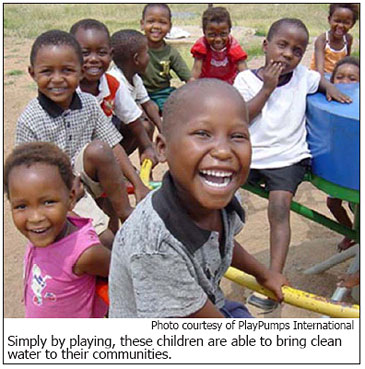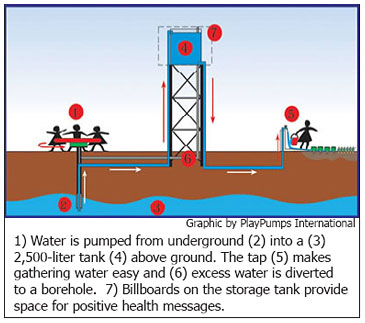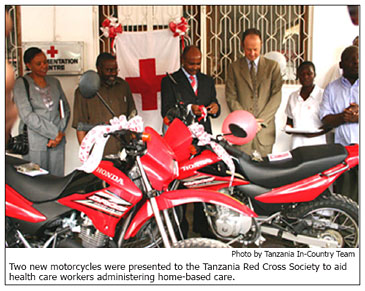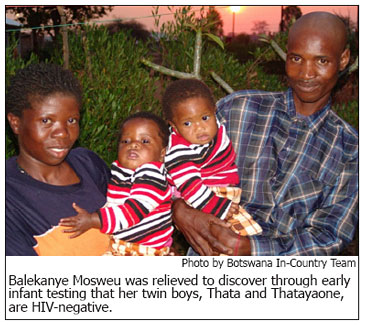|
In this Issue:
Sub-Saharan African: First Lady Laura Bush Announces New Public-Private Partnership [more]
Tanzania: PEPFAR Presents Motorcycles to the Tanzania Red Cross Society [more]
Botswana: Botswana Mothers Benefit from Early Infant Testing Program [more]
First Lady Laura Bush Announces New Public-Private Partnership:
The PlayPump Alliance will support efforts to provide clean drinking water in sub-Saharan Africa

Ten sub-Saharan African nations will benefit from the groundbreaking $60 million PlayPump Alliance announced by First Lady Laura Bush at the Clinton Global Initiative on Sept. 20, 2006. The alliance will bring the benefits of clean drinking water to up to 10 million people in sub-Saharan Africa by 2010.
The PlayPump Alliance is a public-private partnership with PlayPumps International, the Case Foundation, USAID, the U.S. President’s Emergency Plan for AIDS Relief (Emergency Plan/PEPFAR), and other private sector partners.
This partnership will improve access to clean drinking water by installing PlayPump water systems throughout the region. Through an innovative water delivery system, a merry-go-round attached to a water pump and storage tank pumps water from underground. Children’s play, a limitless source of energy, powers the system, making it both a sustainable and child-friendly water delivery system.
The U.S. Government, through USAID and the Emergency Plan, will provide a combined $10 million to the alliance over three years. This will directly support the provision and installation of PlayPump water systems in approximately 650 schools, health centers and HIV-affected communities.
"Around the world, more than a billion people do not have safe water to drink, or to use to keep themselves and their homes clean," Mrs. Bush said during the announcement. Limited access to clean drinking water and basic sanitation facilities adversely impacts the quality of life of children and families in sub-Saharan Africa. |
 |
|
For people living with HIV/AIDS, clean water, proper hygiene and sanitation facilities are of the utmost importance. Access to these resources helps HIV-infected people remain healthy as long as possible and avoid opportunistic infections.
Easy access to clean water will enhance PEPFAR’s ability to support quality care in rural and peri-urban areas where the Emergency Plan supports hospitals, health facilities and clinics. In addition, HIV/AIDS messages on PlayPump billboards will spread the word about healthy behaviors. |
|
Clean drinking water is essential for improving health, education, gender equality and economic development throughout Africa. "Finding clean water is the central daily task of women and girls in many parts of Africa — a task that keeps girls out of the classroom," Mrs. Bush said.
PlayPump water systems alleviate this burden by enabling girls to attend school and allowing women to do other productive activities. The unique design also teaches young people to learn about themselves, gain respect for each other, learn about HIV/AIDS through positive social messaging, break down gender stereotypes, and stimulate their bodies and minds through playing on the merry-go-rounds.
Invented and manufactured in Africa, PlayPump water systems also benefit the community by spurring economic growth. Long-term jobs are created by hiring and training workers to maintain the PlayPump water systems.
PlayPump water systems were first installed in South Africa, where nearly 700 water systems are currently supplying communities with safe drinking water.
|
 |
PEPFAR Presents Motorcycles to the Tanzania Red Cross Society

Tutunzane, a Tanzanian home-based care (HBC) program, will benefit from the donation of two new motorcycles to the Tanzania Red Cross Society (TRCS).
The motorcycles will allow district coordinators to continue efforts to scale-up home based care services in the Kilimanjaro and Tanga regions.
The U.S. Government working through the U.S. President’s Emergency Plan for AIDS Relief (Emergency Plan/PEPFAR) presented the motorcycles during a ceremony at the TRCS offices in Upanga, Tanzania on Sept. 14, 2006. The motorcycles are valued at $12,900.
Motorcycles allow healthcare workers to reach people in their regions who otherwise might not have access to treatment. HBC services promote positive living for people living with and affected by HIV/AIDS and serve as an entry point for antiretroviral treatment.
HBC programs supported by the U.S. Government have been working in Dar es Salaam and Arusha, Tanzania to ensure patients identified with chronic illnesses like HIV/AIDS receive quality care and treatment.
The increased need for HBC services throughout Tanzania caused Tutunzane to expand services to the Kilimanjaro and Tanga regions. |
 |
|
Botswana Mothers Benefit from Early Infant Testing Program

A pilot program for early testing of HIV-exposed infants in Botswana has found that less than 7 percent of the 1,917 infants enrolled were infected with HIV. These results not only offer new evidence to support the effectiveness of Prevention of Mother-to-Child-Transmission (PMTCT) programs, but also offer HIV-infected mothers hope that their babies might be able to live a life free of HIV.
The data was collected by BOTUSA, a U.S.-Botswana collaboration to fight HIV/AIDS, under the U.S. President’s Emergency Plan for AIDS Relief (Emergency Plan/PEPFAR) during a pilot study from June to December of 2005. The study was conducted in Francistown and Gaborone, Botswana.
BOTUSA launched the program to determine the feasibility of implementing widespread early infant testing in Botswana. Due to the program’s successful pilot run, the early infant testing program is being rolled out throughout Botswana this month.
"If babies were infected, the only way to tell would be if they fell sick, and by that time it was too late for most of them," Dr. William Jimbo, PMTCT Chief at BOTUSA said. Early infant testing allows babies with HIV to be identified soon after birth and placed on life-saving treatment.
Under the early infant testing method, health care providers can diagnose infants with HIV using DNA PCR by collecting dried blood spots as early as six weeks after birth. These dried blood samples are stable, do not require refrigeration, and can be transported whenever practical. |
 |
Previously, infants were tested using an ELISA (Enzyme-Linked Immunosorbent Assay) or rapid test. While these tests produce accurate results, the approach was inadequate for program monitoring and clinical purposes since health care workers had to wait until the infant was 18 months old to be tested. By this time, many infants are no longer close to a testing facility or already had advanced HIV.
"The benefits in the short term are of course medical— less sick infants," Dr. Molly Smit of the PMTCT program in Francistown said.
She added that the social benefits to families are even greater. "The relief of knowing that they have negative infants should give mothers hope for the future and to raise their babies with motivation," she said.
Balekanye Mosweu, a 25-year-old HIV-positive mother in Botswana, worried her twins would be born HIV-positive. However, because of early infant testing, she learned her babies were HIV-negative six weeks after their birth.
"It was a miracle," Mosweu said. "At the end of the day, the results came so fast, so it was so much easier to relax and enjoy bringing up my children." Like many HIV-positive mothers, Mosweu worried about caring for not just one but two HIV-positive children.
PEPFAR supported PMTCT program enrollment had increased from 14 percent in 2002 to 83 percent in 2005. Although enrollment in the program was successful, HIV transmission rates to infants had not been documented. The early infant testing program is allowing data on mother-to-child transmission rates to be collected easily and efficiently and offers encouragement to mothers throughout Botswana. |
Find Out More Online
Visit these web sites to learn more about HIV testing and the prevention of mother-to-child transmission:
|
Office of the U.S. Global AIDS Coordinator
2100 Pennsylvania Ave. NW Suite 200 Washington, DC 20522 |

 PDF version
PDF version 